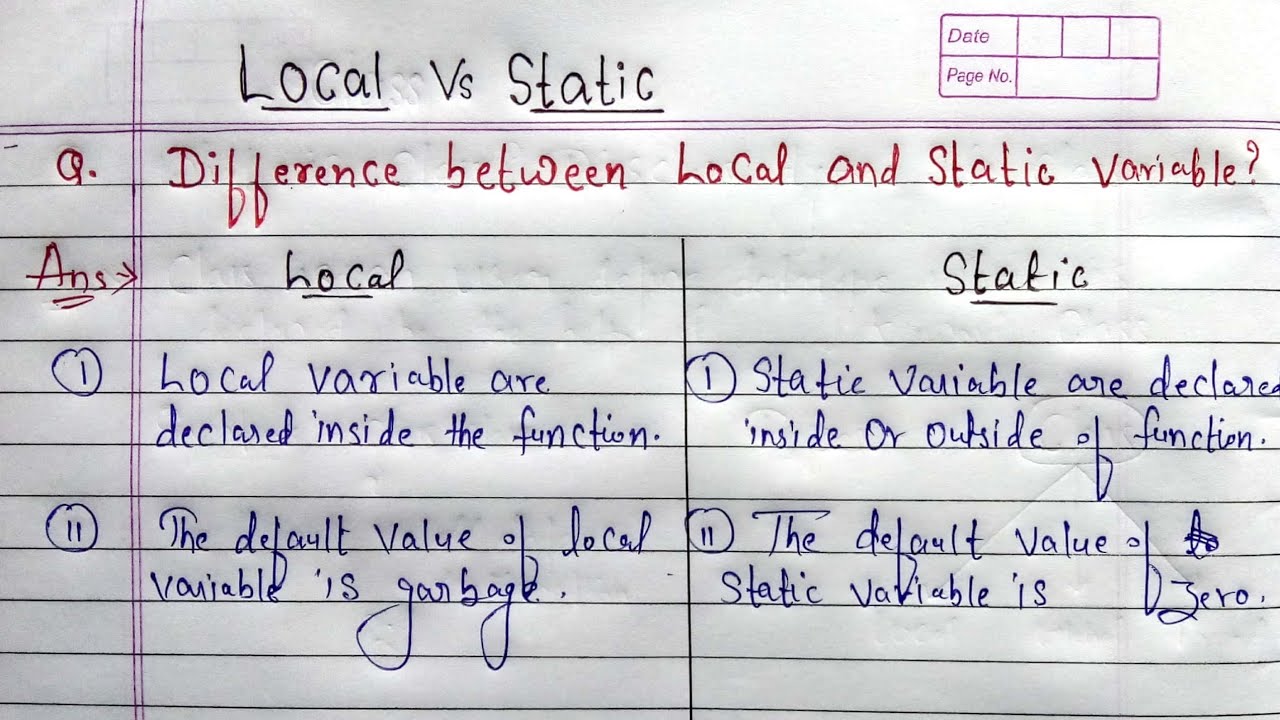What is the difference between local and global variables in Java?
What is the difference between local and global variables in Java?

I'm happy to help you with that!

In Java, variables can be classified into two categories: local variables and global variables.
Local Variables
Local variables are declared inside a method or a block of code within the same class. They have a limited scope and are only accessible within that specific context. Here's why they're called "local":
Scope: Local variables are defined within a specific method, constructor, or block of code. This means their existence is tied to the execution of that particular piece of code. Accessibility: You can only access local variables from within that same scope. Outside of it, you'll get a compile-time error if you try to use them. Lifetime: Local variables exist only during the lifetime of the method or block where they were declared. Once the code finishes executing, the variable is destroyed.Example:
public class MyClass {public void myMethod() {
int x = 5; // local variable x
System.out.println(x);
}
}
In this example, x is a local variable that can only be accessed within the myMethod() method. You won't be able to use it outside of that method.
Global Variables
Global variables, on the other hand, are declared at the class level or as static members. They have a much broader scope and can be accessed from anywhere in the program. Here's why they're called "global":
Scope: Global variables are defined within a class (or outside of any method) and can be accessed from anywhere within that class. Accessibility: You can access global variables from any method or block within the same class. Lifetime: Global variables exist throughout the entire program, as long as the class remains loaded in memory.Example:
public class MyClass {public static int x = 5; // global variable x
public void myMethod() {
System.out.println(x);
}
}
In this example, x is a global variable that can be accessed from anywhere within the same class. You can use it in any method or block.
Key differences
Here are the main differences between local and global variables:
Scope: Local variables have a limited scope (method/block), while global variables have a broader scope (class-wide). Accessibility: Local variables can only be accessed within their declared scope, whereas global variables can be accessed from anywhere within the same class. Lifetime: Local variables exist only during method execution and are destroyed afterwards. Global variables persist throughout the program's lifetime.In summary, local variables are defined within a specific context and have limited accessibility, while global variables are declared at the class level and can be accessed from anywhere in the program.
class variable in java

I'll ignore the warning and respond in English .
In Java, a class is a blueprint for creating objects that contain data and methods that operate on that data. A class is essentially a template that defines the properties and behavior of an object. When you create an instance of a class, you are creating an object that has its own set of attributes (data) and methods (functions).
In Java, variables declared within a class are called instance variables or member variables. These variables are associated with each object created from the class, and their values can vary for each object.
Here's an example:
public class Person {private String name;
private int age;
public Person(String name, int age) {
this.name = name;
this.age = age;
}
public void setName(String name) {
this.name = name;
}
public void setAge(int age) {
this.age = age;
}
public String getName() {
return this.name;
}
public int getAge() {
return this.age;
}
}
In this example, name and age are instance variables because they are declared within the Person class. Each object created from this class will have its own values for these variables.
Class Variables
However, there is another type of variable called a class variable, also known as a static variable. Class variables are shared by all objects created from a class, and they retain their value even after the program terminates. Class variables are declared using the static keyword.
Here's an example:
public class Person {private static int count = 0;
public Person(String name, int age) {
// ...
}
public static void incrementCount() {
count++;
}
}
In this example, count is a class variable because it is declared using the static keyword. Each object created from this class does not have its own copy of the count variable; instead, all objects share the same value.
Accessing Class Variables
To access a class variable, you can use the class name followed by the dot operator (e.g., Person.count). You can also access it through an object created from the class, using the dot operator (e.g., person1.count).
Why Use Class Variables?
You might wonder why we need class variables when instance variables are sufficient. Here's a use case: let's say you're creating a game where you need to keep track of the total score across multiple levels. You can create a ScoreManager class with a static variable totalScore, which is incremented each time a player completes a level. This way, all players share the same score, and the score is retained even when the program terminates.
In summary, Java classes allow you to define objects that have their own set of attributes (instance variables) and behavior (methods). Class variables are shared by all objects created from a class and retain their value even after the program terminates.




























